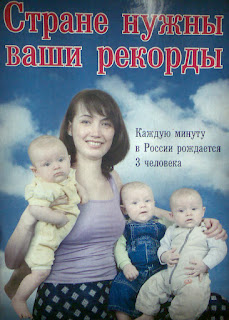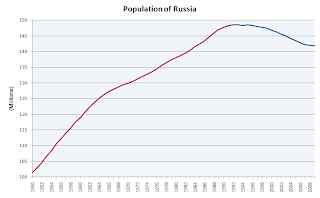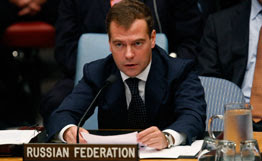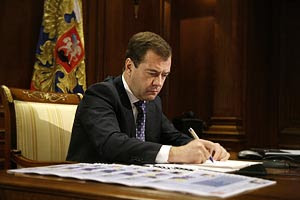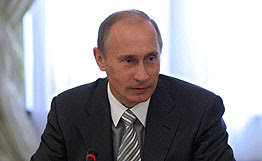Category Archives: 2009
Il futuro dell’Europa è la Russia!
Будущее Европы – это Россия!
Russia is the future of Europe !
US. It is a world where as a result of the rise of other global centers of power and influence the relative significance ofAmerica’s role dwindles, as was already the case over recent decades in the global economy and trade. Leadership is an entirely different question though; it’s above all the question of achieving harmony within a circle of partners, of the ability to be the first, but among equals.”“To define the content of an emerging world order, such terms as multipolar, polycentric and nonpolar are also put forward”
“We do not share the concerns that the current reconfiguration in the world will unavoidably lead to “chaos and anarchy.” There goes the natural process of the formation of a new international architecture – political as well as financial-economic – which would correspond to the new realities.”
“Russia conceives itself as being a part of European civilization having common Christian roots”
“The rigid Anglo-Saxon model of economic and social development is again, as it did in the 1920s, beginning to wobble.the global financial-economic architecture was largely created by the West to suit its own needs. And now that we watch the generally recognized shift of financial-economic power and influence towards the new fast-growing economies, such as China, India, Russia and
Brazil, the inadequacy of this system to the new realities becomes obvious. In reality, a financial-economic basis is needed which would conform to the polycentricity of the contemporary world. The manageability of world development can’t be restored otherwise.”
In a multi polar world with many centres, we could avoid a continental disintegration
– To spread the NATO influence further East in the heart of Eurasia in order to reduce the sphere of influence of Russia (on its close stranger) but mainly in Europe, and avoid a potential development of the Chinese influence towards Central Asia.
Pour la première fois en 15 ans la natalité augmente en Russie !
Comme je l’explique depuis près d’un an maintenant (article publié sur Yahoo actualités en juin 2008) le “plan medvedev” pour la natalité en Russie est efficace. Celui ci a annuellement depuis 205 réduit la chute démographique pour arriver à une quasi stabilisation de la population cette année (2009).
It’s been one year have been trying to demonstrate that the “Medvedev plan” for demographia is efficient and that since 2005 every year, the population is less and less decreasing. This article (in french) have been published on french yahoo news on June the 12Th, 2008.
I recently explained that from january to june 2008, natality was increasing despite the crisis and that 1.000 more children than last year were borned in Russia. Yesterday, this very good news appeared :
– По данным министра здравоохранения и социального развития РФ Татьяны Голиковой, впервые за последние 15 лет в стране зафиксирован естественный прирост населения.
Глава Минздравсоцразвития говорит, что пока рано делать какие-либо выводы на долгосрочную перспективу, но все-таки такая статистика оставляет оптимистичное настроение.
– In Russia the first time in 15 years recorded a natural population growth, said today the Minister of Health and Social Development Tatyana Golikova. According to the Minister at a meeting of the interdepartmental working group on the national project “Health”, in August 2009 was marked by natural population growth of 1 thousand people.
Experts still find it difficult to give a clear assessment of the figures named Golikova. At birth could have a positive impact “unpacking” maternal capital, as well as the fact that it is now fixed by the wave of births, which was “programmed” in 2008 – at sunset of the “cloudy years”.
Some also noted the paradoxical effect of the crisis had an effect to improve the demographic situation. The fall of population decline, noted in the January-August 2009, may be associated with a decrease in alcohol consumption because of economic turmoil.
Le XXIe siècle sera multipolaire!
Le président Lybien à en outre appellé à la création d’une alliance militaire du sud (une OTAN du sud) , qui devrait être opérationnelle en 2011.
Le discours de New York
Après le discours de Munich du 10/02/2007 , veuillez trouver ci dessous des extraits du “discours de new york” (24/09/2009) du président Russe .. Quelques extraits :
” The Cold War is over, as we all believe, but the world has not become more secure. Today we need genuinely modern solutions. We also need clear legal framework for already existing political commitments. We need no declarations, or appeals, or empty talk, but really clear legal frameworks which will, among other points, strengthen one of the principles of the international law, the principle of not ensuring one’s own security at the expense of security of others“.
Peuples et ethnies à Moscou ..
Les premières études statistiques sur la population de la ville datent du 17ième siècle, en 1638 la ville avait a peu près 200.000 habitants. La population diminuera tout au long du siècle suivant pour ne retrouver ce chiffre de 162.000 qu’en 1776.
A la veille de la guerre de 1812 la population de la ville est de 270.000 et de seulement 212.000 à la fin de la guerre. La population est alors composée de 92 orthodoxes pour 100 habitants et de 8 infidéles.
La population augmentera au cours du 19ième siècle pour atteindre en 1882 753.649 habitants. La population est orthodoxe à 91%, il y a 2,28% de vieux croyants, 2,05% de protestants, 2% de juifs, 1,24% de catholiques et autant de musulmans … 96% de la population s’exprimait en langue Russe. 73% de ses habitants n’étaient pas “nés” à Moscou et étaient principalements originaires de : Tula, Kaluga, Riazan ou encore Smolensk.
En 1926, la population atteignait près de 2 millions d’habitants et la moitié n’étaient pas nés à Moscou. Les “Russes ethniques” représentaient 87,5% de la population, les tatares 8%, les Ukrainiens et les juifs à peu près 6,5%.
Le recensement de 1959 voit une augmentation de la population “Russe” (de 87,4 à 89,5%), une diminution de la proportion de Juifs (6,0 à 4 , 1%) mais une hausse de la proportion de Tatars, d’Ukrainiens et de Biélorusses.
En 1989 Moscou comprend 8.972.300 habitants dont près de 89% de Russes, moins de 3,% d’Ukrainiens, moins de 2% de Tatars et quelques autres minorités (juifs, citoyens d’asie centrale …). Pour infos cette année la ont été recencés dans la capitale :
– 7.963.246 Russes
– 252.670 Ukrainiens
– 174.738 Juifs
– 157.376 Tatars
– 73.000 Biélorusses
– 43.989 Arméniens
– 39.916 Mordves
– 20.727 Azéris
– 19.608 Georgiens
– 18.358 Chouvaches
– 9.183 Ouzbeks
– 8.825 Kazaques
– 7.270 Ossètes
– 6.997 Polonais
– 5.417 Bashkirs
– 4.670 Allemands
– 3.986 Lettons
– 3.693 Grecs
….
– 1.275 Arabes
– 1.261 Karèles
– 597 Adygues
– 372 Chinois
– 270 Afghans
– 145 Turcs
– 117 Francais
Après l’effondrement de l’URSS, des bouleversements démogaphiques sans précédents ont frappés la Russie, notamment la capitale Moscou. En 15 ans seulement, la situation s’est totalement inversée. De nombreux migrants se sont installés à Moscou, certains clandestins pour le travail (nombre d’asiatiques Gaustarbeiters), d’autres pour des raisons politiques, d’autres par “mariage” ou tout simplement recherche d’une activité économique quelle qu’elle soit. Les chiffres qui suivent tentent d’intégrer des variables type tel que l’immigration clandestine ou les étrangers non recencés.
Le recencement de 2002 a été effectué par la gazette réputée “arguments et faits”, étayé par les chiffres fournis par le “ministère de l’intérieur” (ГУВД). Il faut noter que selon les estimations officielles de la ville de Moscou, le nombre de clandestins varie de 900.000 à 3 millions de personnes. Il est également à noter que 50 religions sont recencés dans la ville.
Les principaux groupes recencés et estimés en quantité sont les suivants :
Azéris : 1.500.000 personnes
Tatares : 900.000 personnes
Arméniens : 600.000 pesonnes
Juifs : 200.000 personnes
Georgiens : 350.000 personnes
Tsiganes : 300.000 personnes
Moldaves : 300.000 personnes
Tchéchènes : 250.000 personnes
Vietnamiens : 240.000 personnes
Tadjiks : 200.000 personnes
Ouzbeks : 150.000 personnes
Chinois : 350.000 personnes
Afghans : 100.000 personnes
Bachkirs : 100.000 personnes
Daguestanais : 100.000 personnes
Chouvaches : 60.000 personnes
Ingouches : 50.000 personnes
Africains : 50.000 personnes
Yougoslaves : 50.000 personnes
Turcs : 20.000 personnes
Kurdes : 15.000 personnes
Grecs : 20.000 pesonnes
Koréens : 15.000 personnes
Assyriens : 15.000 personnes
Kazaques : 10.000 personnes
Les nombreux ressortissants d’autres groupes, représentent eux près de 200.000 personnes.
Le total de ces “minorités” non Slaves est donc d’approximativement 6,3 millions de personnes sur 10,5 millions d’habitants à Moscou intramuros. Les Russes / Ukrainiens / Biélorusses ne représentent donc à Moscou que 4 millions de personnes soit 40% de la population.
Il est également à noter que les Ukrainiens sont entre 600 et 800.000 et les Biélorusses plus de 100.000.
Du racisme en Russie …
Go Medvedev !
– La trop grande attente des citoyens envers l’état;
– Les problèmes liés à la démographie et l’alcoolisme;
– La chasse aux gaspillages;
Le président en outre soulève certaines questions “clefs”:
“Devons-nous traîner vers l’avenir une économie primitive basée sur les matières premières, une corruption endémique, notre vieille habitude de compter sur l’Etat, sur l’étranger, sur une +doctrine universelle+, sur n’importe quoi sauf sur nous mêmes? La Russie chargée de tels fardeaux a-t-elle un avenir?”
“ La crise économique mondiale a montré que “les choses ne vont franchement pas très bien” pour la Russie, qui n’a pas réussi “ces vingt dernières années à se débarrasser d’une dépendance humiliante des matières premières” et dont l’économie “ignore comme à l’époque soviétique les besoins de l’Homme “.
Pourtant dans le même temps voila les déclarations de Vladimir Poutine, occultées par nos médias :
” Il n’y aura pas de concurrence entre nous en 2012. Nous nous mettrons d’accord, parce que nous sommes des gens de même sang et que nous partageons les mêmes vues politiques.” (source)
ou encore (5 jours après l’article ci dessus) :
” L’état de la culture technologique est à un niveau très bas dans notre pays. Pour cela, il faut payer un prix, non seulement en versant de l’argent mais aussi, malheureusement, par des vies humaines” (source)






